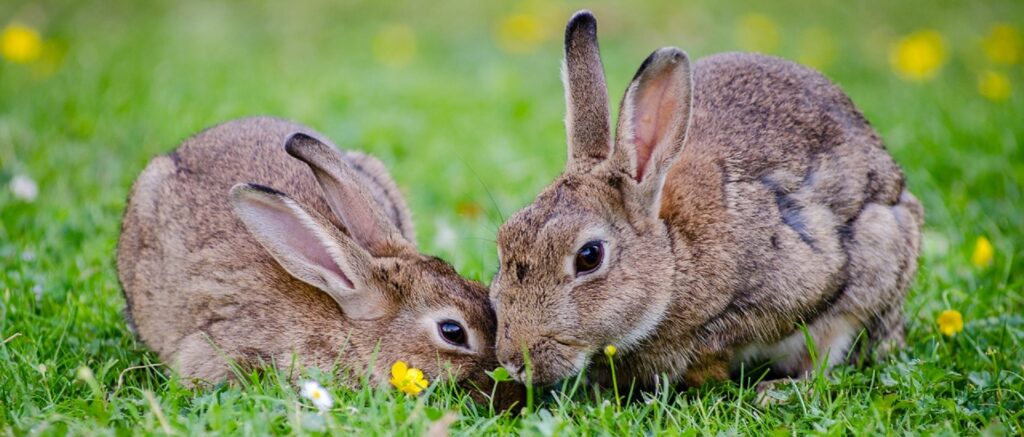
Rabbits
Our How-To Guide for Rabbit Care
Rabbits should be vaccinated against Calicivirus at 10 weeks and 14 weeks of age, and then annually. Calicivirus is a viral haemorrhagic disease and can cause sudden death in rabbits. Further information on vaccinations can be found here.
Myxomatosis is a fatal disease transmitted by mosquitoes. There is no vaccine available in Australia, so prevention is particularly important. Rabbit hutches and outdoor areas should be mosquito-proofed.
Rabbits can get dog and cat fleas, so it is important to use an appropriate topical product, such as revolution for kittens in doses as advised by the vet. DO NOT USE FRONTLINE as it is toxic to rabbits. Please come in and chat to us about an appropriate product and dose for your rabbit.
Rabbits are grazing animals and need to be constantly eating high fibre diets. Typically rabbit mixes from pet stores and supermarkets are NOT high in fibre and are therefore NOT good for rabbits. 75% of the rabbit’s diet should be Timothy or Orchard hay (or Lucerne hay for bunnies under one year old). This should be provided ad lib. Fortified diet should be provided— normally 1-2 tablespoons of the appropriate Oxbow pellets for your rabbit’s age. The remainder should be fresh greens (about a cup of greens per 2kg of bodyweight). Appropriate greens include cos lettuce, bok choy, coriander, parsley, mint, basil, dandelion greens, Asian greens, dill, fennel and sage. We stock Oxbow rabbit food at Doyalson Animal Hospital, and further details can be found here.
Treats like fruits, carrots and Timothy treats should only be provided in small quantities (less than a spoonful a day).
Rabbits are coprophagic, which means they need to eat their night faeces.
Desexing is highly recommended for both male and female rabbits. Both male and female rabbits are more likely to be aggressive and territorial if not desexed and can do harm to each other or their owners. Desexing prevents unwanted pregnancies. Rabbits can reach sexual maturity at about 4 months old, but the sexes should be separated from 10 weeks of age to be safe.
For more information on why you should desex your rabbit and what happens on the day of the desex appointment visit our Desexing Your Rabbit page here.
- A hutch should be a temporary enclosure only, to keep your rabbit safe and secure. It should be large enough to allow the rabbit to exhibit its normal behaviours. All pet rabbits need to exercise outside the hutch for a few hours each day
- Hutches should be easy to clean. Remove soiled bedding daily and totally clean the hutch at least once weekly
- If kept outdoors ensure that the hutch is rain proof and avoid extreme weather conditions. Rabbits can succumb to heat stroke very easily in hot weather. Hutches need to be well ventilated and mosquito proof.
- An upturned box or covered corner of the room should be provided as a safe spot the rabbit can run to if threatened, much like a burrow for wild rabbits.
- Suitable bedding includes hay, straw, shredded paper etc. An all wire floor is unsuitable as it can cause pododermatitis—severe infection of the rabbit’s feet. This can also occur if a rabbit spends a lot of time on slate or tile floors.
Rabbits are sociable animals and like to have rabbit friends, however the best mixes for avoiding fights are two females, male with female (if you want many baby rabbits!) or mixes of neutered rabbits. It is not advisable to mix guinea pigs with rabbits as guinea pigs can get diseases from rabbits. Also, their dietary requirements differ and they may bully each other.
House rabbits can be most delightful pets. It is possible to toilet train a rabbit, much like a cat, as they prefer a particular area to defecate & urinate in. Suitable litter materials include hay, straw, some cat litters (avoid clay types). When rabbits are indoors, be aware that they like to chew electrical cords and furniture.
One of the most common problems rabbits get is dental disease. Their teeth grow continuously through life and need to wear properly to stay healthy. Providing lots of hay is very important to minimise the risk of dental disease.
Just like for dogs and cats, microchipping rabbits can help you find them again if they are lost.
Further information
Dr David Vella, Sydney Exotic Rabbits Vet
Extra information on rabbit behaviour, health etc.
Or ask your friendly veterinary staff at Doyalson Animal Hospital next time you are in!
To schedule an appointment for your rabbit book online or call our friendly staff

